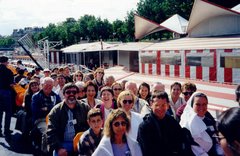Read full story at http://www.ncregister.com/site/article/pilgrims_prosper
BY Tim Drake
Register Senior Writer
October 18-24, 2009 Issue
In a recent Gallup Poll, 42% of respondents said that they had delayed a vacation over the past 60 days in order to help make ends meet. Yet, despite the economic downturn, experts expect 2010 and 2011 to be banner years for religious travel.
Kevin Wright, president and founder of the World Religious Travel Association, said that the next two years look to be “fascinating” for Catholic and religious travel. “Tour operators expect 500,000 visitors for the Oberammergau Passion Play in Germany, which only happens every decade,” he said. In addition, noted Wright, Spain has declared 2010 a holy year because the feast of St. James, July 25, falls on a Sunday, which means that many will be traveling to Santiago de Compostela, whose cathedral has a relic of St. James the Apostle.
According to Wright, religious tourism is, in fact, one of the oldest forms of tourism. “The first tour operator was Thomas Cook, a Baptist minister from England,” said Wright. “He took the first group to the Holy Land in 1861.” Cook’s business has grown into what is now one of the world’s largest travel agencies. Those who conduct tours say they’ve seen many changes since 1861.
Nick Mancino, president of New York-based Regina Tours, which leads between 150 to 200 tours per year, has also seen many changes over the past two decades. “Up until about 10 years ago, the Holy Land was one of the last places Catholics thought about going,” said Mancino. “But since the popes [Paul VI, John Paul II and Benedict XVI] have gone there, it has become a more popular destination.”
Other changes Mancino has seen include an increase in younger pilgrims and a desire for a more comfortable experience.
“In the old days, travelers went for two or three weeks. Because of cost and time, most travelers were retired,” said Mancino. “Now, younger people are traveling, and most travelers are going for only eight to 10 days at a time.”
“Thirty-five years ago, people didn’t care how they flew or where they stayed,” said Mancino. “Now, they’re more prone to ask how they’ll get there and whether the hotel is a one-star or four-star hotel.”
Revenue Secrets from Faith Tourism Experts
5 Step Introduction to the Religious Travel Market
Daily Religious Tourism News
Religious Travel Links
About Me

- kevinjwright
- Kevin J. Wright is one of the world's most recognized religious travel and hospitality authorities. He founded and served as President of the World Religious Travel Association, the leading organization dedicated to the 300 million traveler faith tourism industry. He also served as Chairman of the World Religious Travel Expo, drawing more than 30 countries from around the world. Wright has been interviewed by the CBS Early Show, TIME Magazine, USA TODAY, Wall Street Journal, The New York Times, National Public Radio (NPR), National Geographic, Forbes Traveler, Los Angeles Times, Boston Globe, and dozens of other media outlets. He is the author of four travel guidebooks.
Faith-based Tourism

300 million travelers worldwide
Blog Archive
- January (1)
- December (2)
- November (2)
- October (5)
- September (3)
- August (8)
- July (1)
- June (3)
- May (3)
- April (3)
- March (9)
- February (5)
- January (9)
- December (4)
- November (2)
- October (16)
- September (8)
- August (6)
- July (3)
- June (18)
- April (2)
- November (2)
- September (11)
- August (7)
- July (12)
- June (13)
- May (5)
- April (6)
- March (4)
- December (2)
- November (6)
- October (2)
- September (2)
- August (3)
- July (8)
- June (15)
- May (4)
- April (7)
- March (2)
- February (5)
- January (5)
- December (5)
- August (1)
- July (1)
